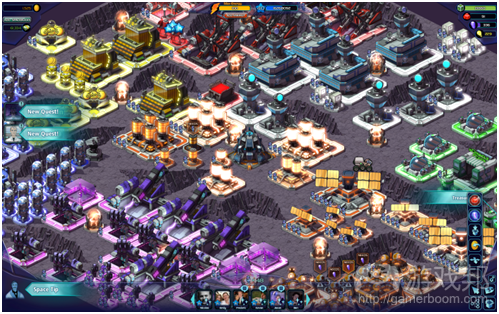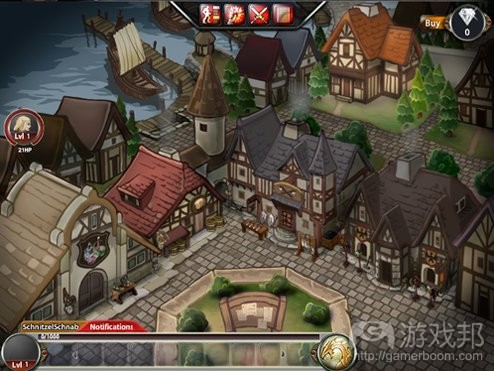分析社交游戏机制和设计选择新趋势
作者:AJ Glasser
随着社交游戏在Facebook和其他平台的持续发展,我们发现许多热门作品日益显现的机制设计趋势和创意。
突出这些独立元素的麻烦之处在于当有社交游戏引入与其他社交游戏类似的模式或技巧时,大家总会大喊“克隆”。当有两款社交游戏效仿某非Facebook电子游戏的热门机制时,大家总是会评断“谁略胜一筹”。我们很难责备这些行为,因为游戏领域不乏复制内容,虽然其依旧由原创作品主导。
但从基本原则层面看,某些构思或设计选择只是为了创造更优质的整体体验(游戏邦注:不论我们先从那款游戏中看到此内容)。随着这些元素的出现,及被主流社交游戏广泛采用,它们逐渐变成玩家审视新社交游戏的标准。
把握这点后,我们开始将注意力转移至风靡当前社交游戏的简单游戏机制和设计选择:
通过移动鼠标收集物品,而非点击
代表作品:《FrontierVille》和《Lucky Space》
1年前,社交游戏的物品收集主要通过玩家积极点击或游戏自动将其添加至玩家仓库中。有些游戏会奖励玩家的点击行为,游戏添加奖励条框,若玩家在特定时间内点击物品将获得游戏货币奖励。虽然此内容富有粘性,但快速点击操作有时会令玩家感到沮丧,他们有时会点错物品,或者电脑无法及时反应系列快速点击。如今游戏引入新机制:当玩家通过鼠标扫过降落物品时,系统会自动收集,无需点击。这给基于收获机制的游戏创造更加流畅的体验(在此机制中,每次操作都会产生至少3个降落物品,以货币、体验积分和游戏资源的形式呈现)。
深层次配对
代表作品:《Tetris Battle》以及即将问世的《Idle Worship》
促使玩家进行肉搏战的游戏通常或基于好友圈安排比赛,或通过随机配对。随着策略题材的发展,开发者开始只在特定关卡中安排比赛——不允许高级玩家攻击低水平玩家,若他们是Facebook好友。另一发展就是进行真正配对,游戏不仅根据关卡级别,还基于其他因素(游戏邦注:如比赛次数、赢过的锦标赛、玩法风格、解锁的技能组合或游戏进程)组合玩家。
排行榜不再局限于《吃豆人》
代表作品:《Triple Town》、《Hero Generations》及其他累积积分的游戏。
排行榜携手电子游戏入驻Facebook,游戏的核心就是获得高分,向其他玩家展示。但其他游戏也开始融入此元素,作为创造游戏社交性的快速便捷渠道。两种题材的作品在引入排行榜元素方面相当活跃——益智和角色扮演游戏,有时甚至将其同传统邻居栏结合,呈现于屏幕底部。其妙处在于引入这样的计分机制:将各种元素转换成由排行榜呈现的单个积分。
高质量配音
代表作品:《Ravenskye City》、《黑手党战争 2》以及即将问世的《CastleVille》
是否还记得Facebook游戏没有配乐的时期?随着开发者纷纷斥资制作游戏配乐,这个时代也就告一段落。这部分是由于开发商就此展开质量军备战——若《Ravenskye City》加入配乐,《黑手党战争 2》就需要融入几首饶舌歌曲,《CastleVille》就得植入丰富的管弦乐。部分是配合主题,因为谁想要在体验农场游戏时听到重金属摇滚?但音效也体现开发者的个人风格;《Lucky Space》开发者A Bit Lucky告诉我们他们在配乐上有自己的一套,希望不遗余力地制作出令整个团队都希望反复聆听的音乐。
用户生成内容
代表作品:《Heroes of Neverwinter》及时尚游戏
社交游戏能够搭载更高级的机制,因此开发商能够向玩家呈现某些游戏道具组合,然后将玩家制作的内容植入游戏当中。这创造了交易和声誉虚拟经济(游戏邦注:类似于我们在传统电子游戏领域新潮社区所看到的模式)。虽然这不如PlayStation 3平台的《小小大星球》高级,但有些游戏的用户生成内容非常精致,足以让开发者给予日常竞赛、虚拟货币,或活跃用户付费奖励。这对开发者非常有利,因为玩家自己创造和宣传新内容,无需开发者照料。
这些只是Facebook游戏包含的若干游戏机制。我们无法细述各机制对游戏流量产生的影响。但即便没有数字说明,不容置疑的是优质玩法能够造就优质游戏。(本文为游戏邦/gamerboom.com编译,拒绝任何不保留版权的转载,如需转载请联系:游戏邦)
Trending Now: Simple Social Game Mechanics and Design Choices Gaining Ground
By AJ Glasser
As social games grow and evolve on Facebook and other networks, we’re observing emerging gameplay trends and ideas in many of the more popular titles today.
The trouble with highlighting these individual components is that it tempts people to cry “clone” whenever one social game introduces a mode or a technique that closely resembles something another social game already tried. There’s also a compulsion to determine “who wore it better” whenever two or more social games replicate the same mechanic made popular by a third video game that isn’t even on the Facebook platform. We can’t really be blamed for these behaviors as there is no shortage of copycat games out there, even with the market being dominated primarily by original games.
On a fundamental level, however, certain ideas or design choices just make for a better overall experience no matter what game in which we see them first. As these components surface and are adopted on a large scale by major social games, it becomes a norm that players look for in each new wave of social game.
With that in mind, we turn our attention to the simple game mechanics and design choices that trending in the current generation of social games:
Mouse-over Item Pickups Instead of Click-Fests
As seen in: FrontierVille, Lucky Space
A year ago, item drops in social games were usually collected by the player actively clicking the item or by waiting for the game to automatically add the item to the player’s inventory. Some games incentivized the clicking behavior by adding a bonus bar that rewarded players with larger amounts of in-game currency for each item clicked in a certain amount of time. While engaging, the rapid-click activity could sometimes frustrate players if they accidentally clicked on something other than the item drop or if their computer was slow to register individual mouse clicks made in rapid succession. Now games are introducing a mechanic that automatically collects dropped items when the player mouses over the item — no click necessary. This creates a much smoother experience for games that rely on a harvest mechanic (which produces at least three item drops per action in the form of currency, experience points, and a in-game resource).
Deeper Matchmaking
As seen in: Tetris Battle, the upcoming Idle Worship
Games that pit players against one another in head-to-head challenges or combat used to arrange matches only within player friend groups or by completely random pairing. As the strategy genre evolved, developers began to arrange matches only within certain level limits — discouraging or totally disallowing higher level players to attack lower level players even if they were friends on Facebook. The next evolution in this process is true matchmaking, where a game sorts players not only by level range, but also by additional factors — like number of matches or tournaments won, gameplay style, or by which skill sets the player has unlocked or advanced within their game.
Leaderboards, They’re Not Just for Pac-Man Anymore
As seen in: Triple Town, Hero Generations, and pretty much everything with a score counter
Leaderboards came to Facebook hand-in-hand with arcade games where the entire point of the game is to achieve a high score for other players to see. Other games genres have begun adopting them, however, as a quick and easy way to make a solitary game feel social. Two genres in particular — puzzle and role-playing — have been especially active in introducing leaderboards, sometimes even marrying them to the traditional neighbors bar displayed along the bottom of the screen. The catch is here is in introducing a scoring system that reconciles various factors (how fast a player completes a puzzle or quest versus how many moves or items it took to complete the activity, etc.) into a single score that can be tracked by leaderboard.
High Quality Soundtracks
As heard in: Ravenskye City, Mafia Wars 2, the upcoming CastleVille
Remember when Facebook games didn’t even have music? Those days are very much done with developer investing larger amounts of money into crafting game soundtracks. Part of this is a quality arms race among developers — if Ravenskye City gets vocals, Mafia Wars 2 needs several rap songs, then CastleVille has to have a full orchestra and so on. Part of it is also a theme concern, because who wants to listen to heavy metal while playing a farm sim? Soundtracks, however, are also about reflecting the personal style of the developer; Lucky Space developer A Bit Lucky told us it went out of its way to create a soundtrack that the entire team felt it could listen to endlessly.
User-Generated Content, Where the Player Does the Work for You
As seen in: Heroes of Neverwinter, fashion games
Now that social games are capable of more advanced mechanics, developers are able to expose certain tool sets of their game to players and then turn around and incorporate what the player makes into the game. This creates a virtual economy of trade and reputation similar to what we see in the traditional video games industry among the modding communities. Though not as advanced as, say, LittleBigPlanet for the PlayStation 3, the user-generated content in some games is sophisticated enough for developers to incentivize it with routine contests and virtual currency prizes or payouts for the most active players. This works to the developer’s advantage because players create and promote new content on their own, without much need for oversight from the developer (in contrast to player versus player-focused games that frequently need moderators to clamp down on griefing).
These are just a handful of the smaller-scale game mechanics and design choices we see trending among popular social games on the Facebook platform. Alas, we cannot break out the actual traffic impact each feature can or does have on social games before and after. Even without the numbers to back it up, however, it shouldn’t be a stretch to conclude that a better gameplay experience makes for a better game.(Source:insidesocialgames)
下一篇:解析人类社交地位对游戏设计的影响









































 闽公网安备35020302001549号
闽公网安备35020302001549号